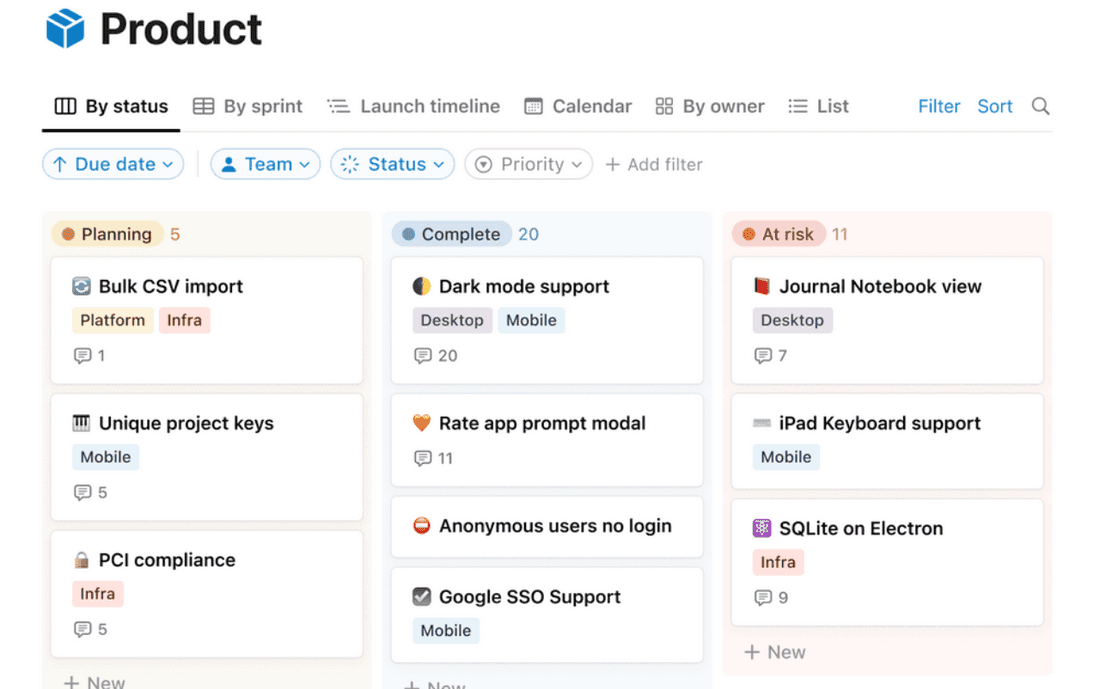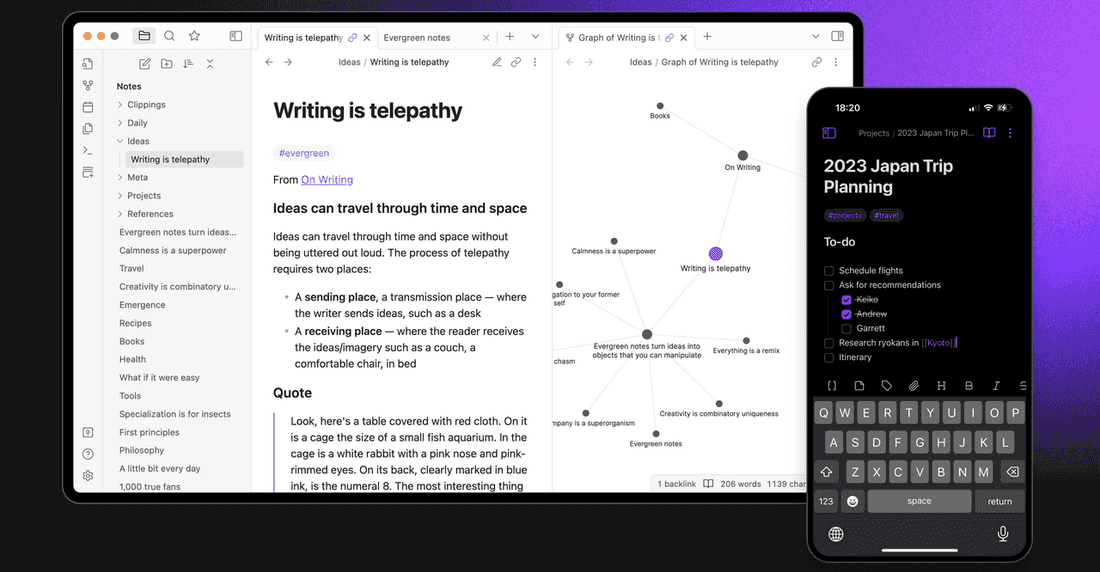Obsidian VS Notion: Which Note-Taking App Should You Choose?
Unless you’re blessed with eidetic memory, it’s challenging to keep every detail and idea in your head. It’s common practice for PMs to capture and record their thoughts and insights from their team members.
When asked which tool is best suited for this task, many point towards Obsidian and Notion as top contenders. Both are sophisticated apps designed for note-taking, but what sets them apart?
In this article, we aim to:
- Discover what sets Notion and Obsidian apart regarding features, costs, and practical applications.
- Explain the situations where one might edge out the other for organizing a PM’s world.
- Offer some other contenders like Fibery that can add versatility to how you manage information.
Notion and Obsidian – A Comparison
At first glance, Notion and Obsidian appear to serve a similar purpose. They both provide platforms for jotting down notes, sorting out thoughts, and collaborating with others.
However, when you look closer, it becomes clear that these tools are distinct in their approach to note-taking within product management.
Let’s take a closer look at each application to understand how they differ in fulfilling the same function.
Notion – The Organizational Powerhouse

Notion is a multifaceted workspace with the ability to combine diverse digital functions under one roof. It’s the go-to platform for many who aim to simplify their collection of online tools.
Notion elements like note-taking, task tracking, databases, and calendars have strong features that encourage teamwork. It enables both teams and solo users to organize content, map out projects, and enhance operational efficiency.
The interface is designed with flexibility in mind. Whether ticking off daily tasks or guiding intricate project timelines, its environment maintains visual clarity across varied information types and action plans.
This versatility makes Notion particularly attractive for those seeking a coherent method to handle different strands of digital work life seamlessly.
Notion at a glance:
| Feature | Available | Comment |
| AI-Driven | ✅ | Supports smart workflows |
| Mobile Application | ✅ | Available on iOS and Android |
| Full Offline Functionality | ❌ | Limited to Read-Only |
| Publish as Websites | ✅ | Easily Share notes as websites |
| Backlinks | ✅ | Interconnected note creation |
| Collaboration in Real Time | ✅ | Seamless team collaboration |
| Templates | ✅ | Pre-built options |
| Device Sync | ✅ | Online device sync |
| 3rd Party Embed | ✅ | Embed notes as tools and media |
Notion - Pros
- Multi-Use Platform: Notion is a place for project management, taking notes, managing databases, and team collaboration. Its flexible design means you can shape it to suit your needs, from jotting down quick reminders to tracking detailed projects.
- Teamwork in Action: With Notion, teams can collaborate easily and efficiently. It’s similar to Google Docs but with extra features such as comments, @mentions of teammates, and updates that everyone sees right away.
- Connects with Your Tools: Notion plays well with other software like Slack or Google Calendar and supports automation too. This helps bring all your different tools into one place for smoother operation.
Notion - Cons
- Usability and Training: Notion’s wide range of features means there can be quite a bit to learn. Newcomers might need time to get the hang of all the different tools available.
- Speed Hiccups: For those with lots of data or intricate configurations, sometimes the platform doesn’t move as quickly as you’d like. This could slow things down, especially for teams who are always racing against the clock.
Notion - Price Point
- Personal: Free with limited features
- Plus: $8 per user, per month
- Business: $15 per user, per month
- Enterprise: Custom pricing
Obsidian – The Knowledge Management Specialist

Obsidian is a formidable knowledge management companion, appealing to individuals who prioritize the confidentiality of their information, desire deep personalization capabilities, and admire an aesthetically pleasing interface.
Obsidian operates like a second brain—a space where users can generate notes that interconnect in a private and intricate web.
This system champions data sovereignty by housing all your insights on local storage. There’s no need for cloud storage here; you’re at the helm.
Markdown is the language of choice within Obsidian. It allows you to shape and categorize thoughts with finesse.
The software particularly resonates with writers, academics, and developers due to its resilient plugin environment that offers unlimited customizations to align impeccably with how they work.
Obsidian at a glance:
| Feature | Available | Comment |
| AI-Driven | ❌ | It’s all you |
| Mobile Application | ✅ | Available on iOS and Android |
| Full Offline Functionality | ✅ | Doesn’t require internet connection |
| Publish as Websites | �✅ | Notes can be published as websites |
| Backlinks | ✅ | Complex note-taking is supported |
| Collaboration in Real Time | ❌ | Limited team collaboration |
| Templates | ✅ | Customizable templates available |
| Device Sync | ✅ | Data can be synced across devices |
| 3rd Party Embed | ❌ | Does not support external embedding |
Obsidian - Pros
- Data Locality: Obsidian keeps your data on your device, which is great for anyone who takes their privacy seriously and prefers to manage their own information without depending on cloud services.
- Markdown Support: Obsidian was created with Markdown users in mind. If you enjoy using this straightforward coding language for writing, you’ll find that Obsidian meshes well with the way developers like to work.
- Extensibility: You can significantly broaden Obsidian’s capabilities by adding plugins made by our community. Need an organizer for daily notes, a visual map of your connections, or some custom features? There’s probably a plugin just waiting to help.
Obsidian - Cons
- No Real-Time Teamwork: Obsidian isn’t set up for instant team collaboration like Notion is. For group projects, you’ll need to get extra help from other plugins or sync tools, which might make things a bit trickier.
- Made for the Tech-Savvy: If you’re not into coding, Obsidian’s heavy use of Markdown and its plugin system could be a hurdle. It’s designed with features that developers love but might seem overwhelming if tech isn’t really your thing.
Obsidian - Price Point
- Core software: Free
- Commercial: $50 per month
- Catalyst license (for early access to new features): $25 one-time
- Sync service: $8 per month
- Publish service: $16 per month
Which to Choose as a PM?
As a project manager, selecting the right tool, Notion versus Obsidian, boils down to what’s more important for your workflow: Flexibility and teamwork or having complete ownership of your data with tailor-made features.
If you’re juggling various team projects daily and need an overview of all moving parts at a glance, Notion could be just what you’re looking for.
However, if you’re keen on crafting a detailed personal knowledge repository that reflects intricate relationships between ideas, then Obsidian might suit your needs better.
Alternatives to Notion and Obsidian
Notion and Obsidian might be at the top of many lists, but it’s worth considering some other strong contenders in this space:
1. Fibery
Okay, we may have a soft spot for Fibery. But truly, it’s an agile platform that blends note-taking with project management features plus robust automation options. It’s particularly effective for teams who need to pivot quickly and work seamlessly with various systems.
To start your free trial, sign up for Fibery here.
2. Microsoft OneNote
For those already working within Microsoft’s suite of tools, OneNote is a reliable option that offers solid note-taking functionality. Its collaborative capabilities and smooth integration with services like SharePoint make it a go-to choice if you’re living in the Microsoft world.
3. Evernote
It used to reign supreme among note apps and still stands as an excellent alternative for fundamental note organization needs. If you’re looking for dependable notetaking without unnecessary frills, Evernote continues to deliver just that.
The PM’s Hot Take
“To be honest here, both tools have their place, but it’s like comparing apples to… well, different apples. It’s really about choosing the one that fits easily into how you already work instead of having to change your methods to suit the tool.”
Conclusion
It’s clear that Notion and Obsidian bring unique offerings to the table, each with its distinct advantages. The decision on which app suits you as a product manager hinges on your individual requirements and how you like to operate within your team.
If your hunt is for an application adept at capturing ideas and facilitating seamless sharing among colleagues, Fibery stands out as a versatile candidate. It has been designed by product managers who understand the intricacies of this role. More than just note-taking, it can transform your entire project workflow.
For those wanting more insight into how these tools measure up, not only against each other but also in comparison with Fibery, our comprehensive review offers direct comparisons that might help steer your choice toward making day-to-day tasks smoother and more efficient.
FAQ
Q: Is Obsidian better than Notion?
That really hinges on what’s important to you. If keeping your data private and having the freedom to tweak things is your priority, then Obsidian might be up your alley.
On the flip side, if working together with others easily and having a tool that can flexibly handle different tasks matters more, then Notion could be what you’re looking for.
Q: What is better than Obsidian?
If teaming up with others smoothly or wanting everything tied neatly—from planning stages to task automation—is critical in managing projects, alternatives like Fibery may fit your bill better.
Q: Is Obsidian actually useful?
For sure, especially if you’re someone who likes their information close and wants a space where everything connects seamlessly using Markdown (it’s kind of like digital Lego blocks for text).
Q: What is the difference between Obsidian and Notion journaling?
If linking ideas privately gets you going, go for Obsidian; it’s great at making connections while keeping it simple text-wise. But if visual appeal plus easy teamwork are key ingredients in how you journal, consider giving Notion a spin—it’s built for those features right out of the gate.
Psst... Wanna try Fibery? 👀
Infinitely flexible product discovery & development platform.